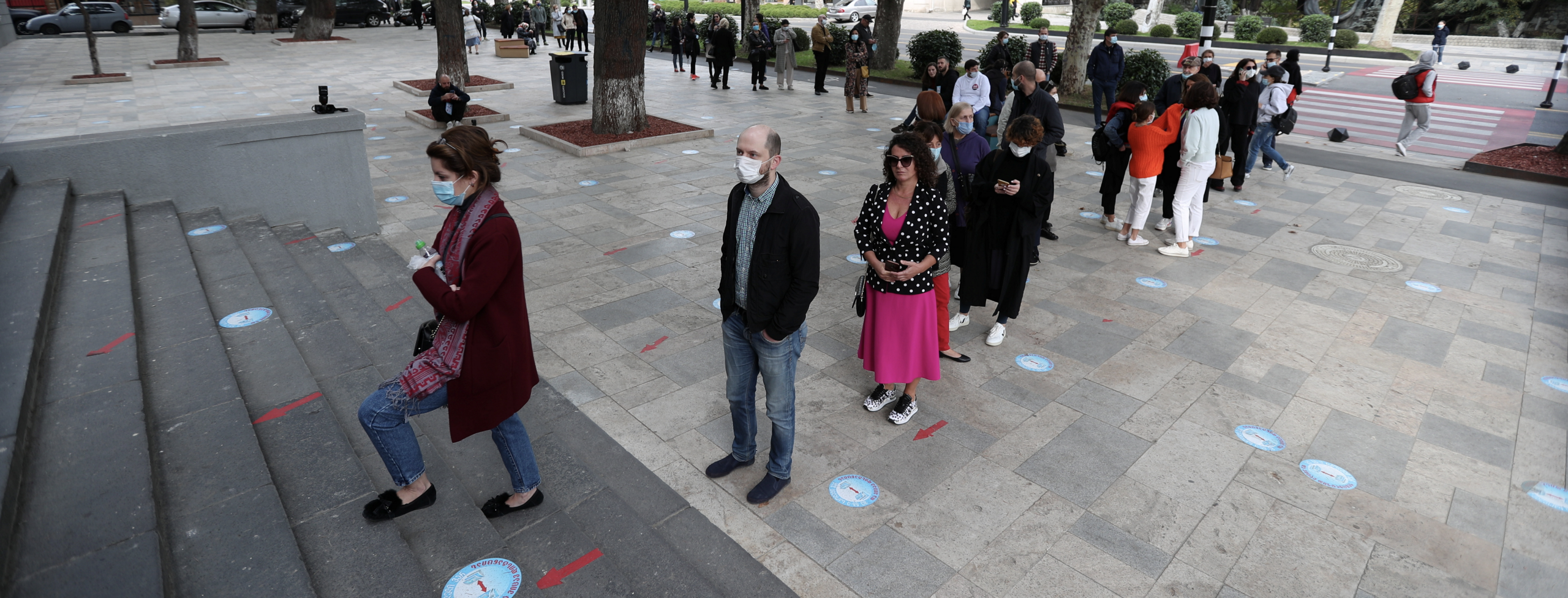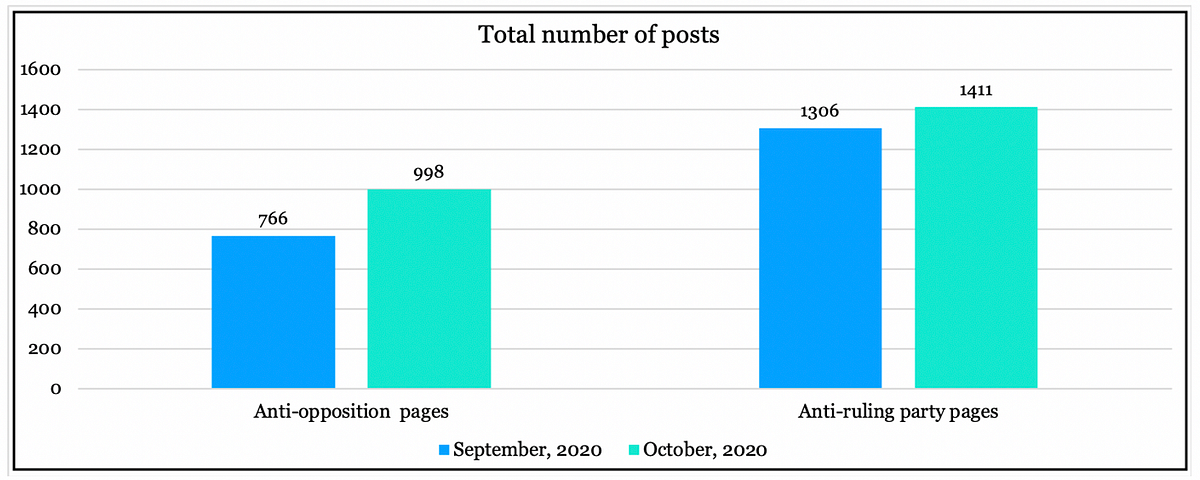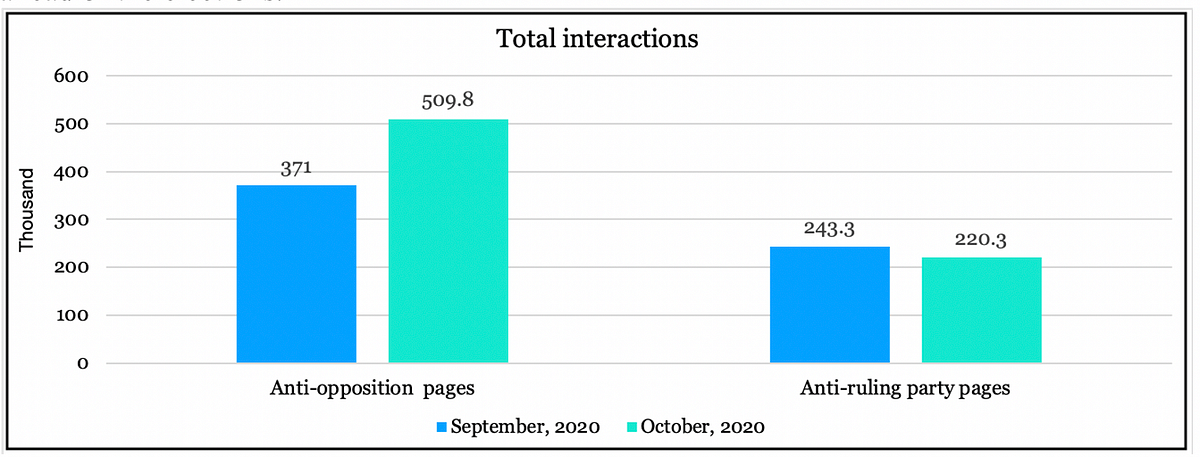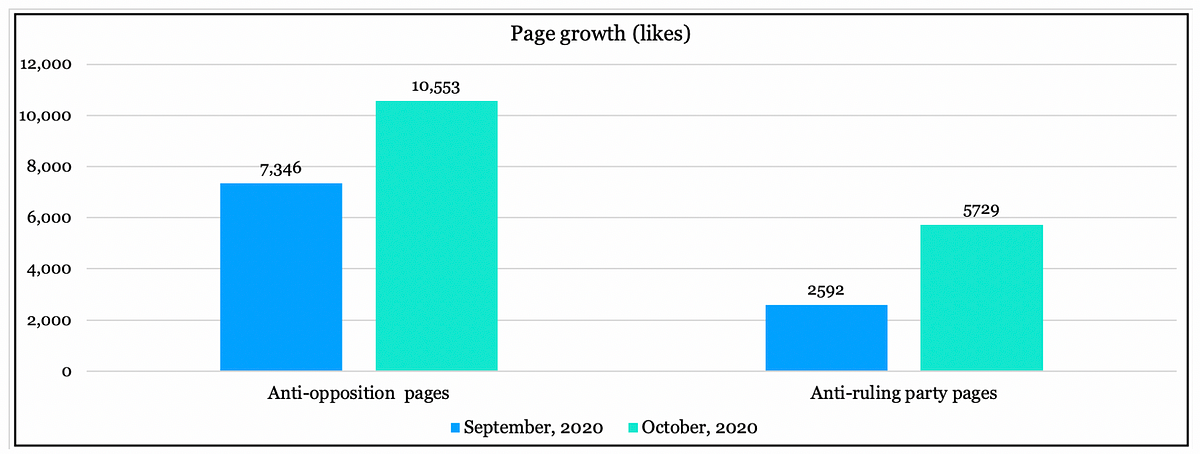Anonymous Facebook pages intensified negative posts ahead of Georgian parliamentary elections
Pages undertook political trolling campaigns against Georgian Dream and opposition parties prior to voting on October 31
Anonymous Facebook pages intensified negative posts ahead of Georgian parliamentary elections

BANNER: People line up outside a polling station during a parliamentary election in Tbilisi, Georgia October 31, 2020. (Source: REUTERS/Irakli Gedenidze)
In the run-up to the 2020 parliamentary elections in Georgia, multiple anonymous Facebook pages were involved in negative campaigning aimed at smearing political actors. These pages undertook coordinated campaigns against political parties and individual politicians on both sides of the political spectrum — the ruling party and the opposition. The main objective was to manipulate public opinion and shape negative sentiments among voters. The DFRLab compared the activities of two such networks: one targeting opposition parties and the other targeting the ruling party, Georgian Dream.
The DFRLab has previously reported on the activities of official party Facebook pages ahead of the elections. However, apart from official pages, anonymous Facebook pages also work in favor of political parties, but links between political parties and these pages are not always explicit. These anonymous pages conduct negative campaigning, spread discrediting political propaganda and pollute the digital information ecosystem. The DFRLab analysis showed that these pages became more active in the final month ahead of the elections. Nevertheless, it is challenging to discern what impact the political trolling campaign had, if any, on voter choice.
The use of political trolling and inauthentic behavior on social media to shape public attitudes is not a novelty in Georgia. In December 2019, Facebook removed an inauthentic network connected to Georgian Dream. In May 2020, it also took down a large network of assets connected to a digital media company called Espersona.
ISFED’s Disinfo Observer platform aggregates Facebook pages in Georgia spreading disinformation and divisive narratives, as well as showing signs of inauthentic activity. The DFRLab used this tool to collect 20 anonymous pages with the highest number of interactions during September and October 2020. Ten out of the 20 pages were involved in negative campaigning against the vast majority of opposition parties; the other 10 pages targeted Georgian Dream.
Anti-opposition pages focused on attacking or discrediting about opposition politicians with memes and other forms of divisive content, which was actively distributed in multiple Facebook groups. These pages amplified messages that were in sync with the main messages of ruling party politicians about opposition figures. Negative posts mainly attacked personal traits of opposition figures and were less focused on policy preferences or political agendas. Most of these anonymous pages had misleading names and no identifying page manager information.

Like the anti-opposition pages, the anti-ruling party pages also focused on launching personal attacks on members of the ruling party:

The DFRLab examined key metrics regarding negative campaigning on these pages in September and October 2020 to see how active they became ahead of elections. Anonymous pages in both camps posted more content in October 2020 than in September, but this growth was not equal: 10 anti-opposition pages posted 30 percent more posts in October, while the increase in posting of anti-ruling party pages was only around 8 percent. Nevertheless, anti-ruling party pages posted 36 percent more posts total during both observation windows than anti-opposition pages. In short, anti-opposition pages became more active ahead of the elections, but they still posted less often than the anti-ruling party pages.

While the anonymous anti-opposition pages posted significantly fewer posts in September and October combined, they garnered almost twice the number of interactions in October 2020 as the anti-ruling party pages. Moreover, despite the 8 percent increase in posting from September to October, anti-ruling party pages garnered fewer interactions in October in comparison with September 2020. As for anti-opposition pages, a 30 percent increase in posting translated into 37 percent higher interaction in October. This analysis shows that anti-opposition content achieved greater engagement than anti-ruling party content ahead of the elections.

Anonymous pages on both sides also tried to grow their audience ahead of the elections; anti-opposition pages turned out to be more successful in this regard, which gained 7,000 and 10,000 new likes in September and October, respectively. This indicates that these pages registered twice the audience increase in September and October of anti-ruling party pages.

Negative campaigning ahead of elections on social media can amplify social polarization. The pre-election period in Georgia was accompanied by heavy negative campaigning from anonymous source. Analysis of anti-opposition and anti-ruling party pages showed that increased polarization and the contentious political environment served as fertile ground for these pages to quickly increase their audience size and engagement rates on Facebook ahead of the elections.
Givi Gigitashvili is Research Assistant, Caucasus, with the Digital Forensic Research Lab and is based in Georgia.
This research is part of the #ElectionWatch Georgia project in partnership with On.ge, made possible through support from East-West Management Institute (EWMI) and US Agency for International Development (USAID). Contents of this report are the sole responsibility of the author and do not necessarily reflect the views of EWMI, USAID or US Government.
Follow along on Twitter for more in-depth analysis from our #DigitalSherlocks.

